Leave Me Alone
I can't stop thinking about how a competition survival reality show intersects with Little House on the Prairie.
Alone, for the uninitiated, is a competition reality show that plunks ten contestants into the wilderness with limited supplies (and a suitcase of camera gear). Whoever can last the longest or 100 days, wins $500,000. The show gained a large following (including me) over the pandemic as we bunkered on our sofas.
What kind of person leaves everything to sleep in a moss tent in Tasmania? Well, someone similar in temperament, perhaps, to a man who would drag their family away from a perfectly good life in Pepin, Wisconsin, to homestead all over the bleeping Midwestern Territories so he could “win a bet with Uncle Sam.”
You know, someone free and independent.
Part of what I love about Alone is that it helps me better understand Laura Ingalls Wilder’s childhood. She grew up the way some of these contestants did, with a father who had to come home with game, or the family would go hungry. Many of these survivalists gained their skills out of necessity, not hobby. They come from places like Alaska. And Alaska.
Most Alone contestants adhere to the ethos of the Little House books, that the disciplined, resourceful, and self-reliant will make it whereas the ignorant, unskilled, and emotionally weak will tap out and “go back East.”
Charles Ingalls is portrayed as a skilled hunter and trapper whose sense of humor and ability to adapt means he’ll succeed. By contrast, the Books tell cautionary tales of men who die because they didn’t have the sense to crawl in a haystack before a storm (Greenhorns!) and of people like Mrs. Brewster, whose minds snap.
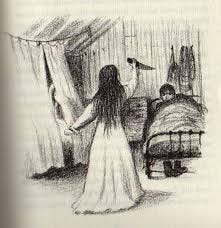
The thing is there’s alone and then there’s loneliness. You might know how to shoot, skin, and smoke an animal, but can’t endure the whistling wind for company.
You learn to spot Tappers on Alone, the contestants who melt down within a few days, bailing from what amounts to an elaborate camping trip. These “seasoned survivalists” (to quote the show)—despite having made an audition tape, enduring the vetting process, and signing a thousand waivers stating they fully understand the dangers of giardia, bear mauling, and axe-ident—freak the second the boat turns around. Waves from the wake still lap the shoreline.
“Oh my god,” The Tapper says. “I’m all alone.”
Um, yeah, bruh. It’s the title of the show. (Note: The Alone show makes you real judgy.)
This moment is known as Drop Shock. The contestants are warned about it. Most get past it. Some don’t.
While Judgy Me judges the Tappers, Kind Me understands that you can’t imagine certain experiences until you’re in them, experiences like getting left in the middle of Saskatchewan or homesteading the Dakota Territories through eight months of winter.
I’ll always be haunted by the contestant who befriended a squirrel before he shot and ate it. He couldn’t take that he’d eaten his sole companion, broke down, and tapped out.
Then there’s the woman who skinned and stuffed a bunny, which became her beloved, taxidermied Wilson pet.
Contestants regularly kiss their freshly caught game—in other words, dead animals. Trout, especially, see a lot of lip action.
Pa had a wife to kiss. Almanzo guessed pretty quick there was no way he wanted to homestead alone. But the Books love the refrain, free and independent.
At the beginning of The Long Winter, Rose/Laura (the writers) not-so-subtly sneak this ethos when Laura (the character) observes the thickness of the muskrats' lodges. She wants to know how the muskrats know a hard winter’s coming. Pa replies, "God tells them, somehow, I suppose." Thus ensues a father/daughter chat about how animals can’t choose the sort of house they build, but “folks build all kinds of houses.” Because why? You know it!
Because “A man can build any kind of house he can think of. So if his house don't keep out the weather, that's his look-out; he's free and independent.”
Note: God might not have warned the Ingalls family, but an Indigenous person (rather graciously, we might add) did. Pa, at least, (as the story goes) had the sense to heed the warning and stockpiled hay the family would burn to survive that winter.
Choice of shelter is, incidentally, a key strategy to Alone. An elaborate shelter can be the key to long-term success, or calories expended might burn up a person's reserves, and they're done.
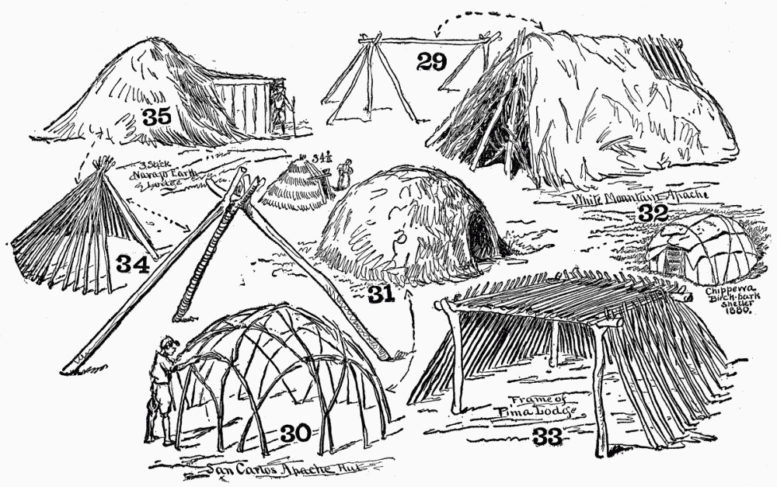
Once the Tappers are gone, viewers sock in to watch how a combination of choices, skills, temperament, and luck will play out. Whose survival strategy will pay off? Gill net or big game? Dugout or cabin? Keeping busy or conserving resources?
The goal of Alone isn’t to settle the land but outlast nine people for a cash prize. So far only one person has made it 100 days, and when the boat arrived he didn’t say, “You know, thanks for the cash but I think I’ll just stay here on the Great Slave Lake.”
Contestants talk about “surthriving,” but dropping people alone on a patch of land is an endgame from the start. Contestants discuss Indigenous techniques for trapping, fishing, and building shelter in their environments, but homo sapiens didn’t create the Anthropocene because one man marched into the woods with axe. We aren’t solitary animals like panthers or moose or polar bears or muskrats, and even muskrats snuggle in the winter for warmth.
This colonialist failure to understand how humanity works was part of the disaster of the Homestead Act. It doesn’t work to chop the land up into squares like a tray of brownies.
But don’t tell Rose Wilder Lane that. If Rose had been a contestant, I bet she would have been the stubborn type who gets pulled by medical. The Denier (as opposed to the Tapper) insists they are fine during med checks, even as their jaws move up and down like Mexican Day of the Dead marionettes.
As for myself, I’d never be the person who strangles a wombat with her bare hands or eats her belt, but there’s one skill I could bring to the bush: I can be alone.
I was left alone for hours as a kid. Days. I was dropped off at friends’ parents’ houses, day camps, night camps, the YMCA, the library... My grandmother let me watch Wheel of Fortune with her while she smoked cigarettes, but aside from those thirty minutes, I was expected to leave her alone. I didn’t have a sibling until I was eight, which psychologists say is the same as growing up as an only child.
My mother allowed me to sit on the floor of her bedroom so long as I didn’t disturb her reading. I stalked her companionship like a hunter through the green shag carpet, using her stack of paperback mysteries as camouflage. If you can’t beat ‘em, join ‘em. And that’s how I wound up reading the entire John D. MacDonald Travis McGee series by third grade.
Then Mom went back to work and I became a typical Gen X latchkey kid watching Gilligan’s Island reruns, a show about people stuck on an island.
But mostly I read. And guess what genre I loved best? Survival stories. The Little House books, obviously. Also, The Black Stallion. Robinson Crusoe. The Call of the Wild. Z is for Zachariah. The result of this suburban survivalist upbringing is that I love to be alone. That is, until I get lonely, tap out, and call someone. It’s complicated.
Laura wasn’t lonely, sleeping next to her sister every night, her parents right there. Rose Wilder Lane’s diaries, on the other hand, indicate she was very lonely. She continually brought people into her life only to drive them away.
They say lonely kids often become writers in the desperate hope that they will finally connect with people and be liked.
Hmmmm.
Alone contestants can bring ten items. So far, no one has chosen a book over an axe or fishing lures. But maybe that’s their mistake.
Hey, Alone show! If you want to pay me to endure 72 hours with a tarp, flint, sleeping bag, water, and a book, I’ll be your lingonberry.
I have no illusions about my inability to survive all that long, but I would relish outlasting the Ted Nugent type of Tapper. These men (always men) posture and strut only to fall down, cry, and call for help within a few days. It’s amazing how these men have kids who need them all of a sudden.
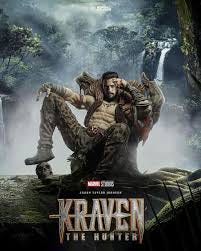
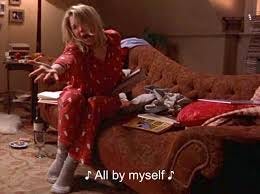
My bet isn’t that I would win, but that I wouldn’t be the first to go, either. I’ve endured versions of Drop Shock many times in life, where I was left to suck it up. I can watch a boat go. I’ll hang my tarp and record footage of myself reading minute by minute so you can speed ramp the footage.
The viewership might enjoy watching a self-proclaimed Apex predator getting out-Alone-d by a 56-year-old woman curled up with her worn copy of The Long Winter.





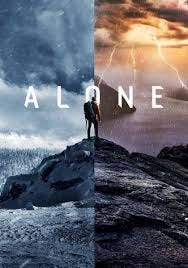
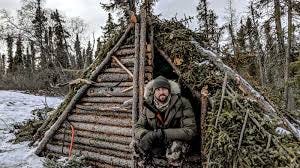
It's so funny, I started reading this entry thinking, "She's a Gen X-er!" as I recognize my fellow survivor. I personally can't watch survival shows because they actually do remind me of my childhood. Right there with you in solidarity, childhood memories and survival skills. I also always think of the book I'd take to a desert island. Great entry!
Some of the best storytelling I have read in a while (the joy have reading has been really hard for me since the pandemic).
You are right-while the Ingalls family was alone, they were never lonely. But Rose was always trying to fill her loneliness with people; and then she realized they weren’t as smart as she or they didn’t live up to her standards (because they were free and independent, too) and she was left behind OR she pushed them away.
There is a kindred spirit of Gen X and LHOTP. Not only because most of our generation watched the show/read the books, but also because we were left alone to figure it out. “children must be seen and not heard”. Those lessons resonate deep into our collective souls. Rose was left alone a lot, too.
There might be a political point to this train of thought. We expect people to not be soft, pull up by bootstraps and quitters aren’t good (Goonies never say die). Are we being Rose-like with peers who didn’t get the message of empathy? Did Laura exhibit empathy? There is judgement of Mrs. Brewster and those who gave up and went back east.
Our culture is built on bootstrapping. And frontiers…we conquered the American West desert, we went to space, now it seems like we in some sort of weird land grab, but also deporting people so there is MORE resources for fewer people. We keep a survivalist mentality because we don’t want to go backwards, but I worry that for those that want to quit the show, there is no safe “back east” to return home to.
Ok so musings/ranting is not what I wanted to do here (much less end a sentence with a preposition). We romanticize obstacles and achieving goals, when maybe we should celebrate those who demonstrated kindness or empathy. 🤔